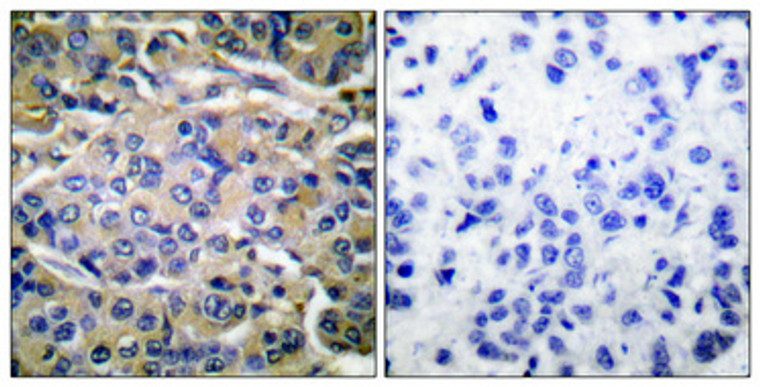| Host: |
Rabbit |
| Applications: |
WB/IHC/IF/ELISA |
| Reactivity: |
Human/Mouse/Rat |
| Note: |
STRICTLY FOR FURTHER SCIENTIFIC RESEARCH USE ONLY (RUO). MUST NOT TO BE USED IN DIAGNOSTIC OR THERAPEUTIC APPLICATIONS. |
| Short Description: |
Rabbit polyclonal antibody anti-Phospho-Ribosomal protein S6 kinase beta-1-Thr421 is suitable for use in Western Blot, Immunohistochemistry, Immunofluorescence and ELISA research applications. |
| Clonality: |
Polyclonal |
| Conjugation: |
Unconjugated |
| Isotype: |
IgG |
| Formulation: |
Liquid in PBS containing 50% Glycerol, 0.5% BSA and 0.02% Sodium Azide. |
| Purification: |
The antibody was affinity-purified from rabbit antiserum by affinity-chromatography using epitope-specific immunogen. |
| Concentration: |
1 mg/mL |
| Dilution Range: |
WB 1:500-1:2000IHC 1:100-1:300ELISA 1:10000IF 1:50-200 |
| Storage Instruction: |
Store at-20°C for up to 1 year from the date of receipt, and avoid repeat freeze-thaw cycles. |
| Gene Symbol: |
RPS6KB1 |
| Gene ID: |
6198 |
| Uniprot ID: |
KS6B1_HUMAN |
| Specificity: |
Phospho-p70 S6 kinase Alpha (T421) Polyclonal Antibody detects endogenous levels of p70 S6 kinase Alpha protein only when phosphorylated at T421. |
| Immunogen: |
Synthesized phospho-peptide around the phosphorylation site of human p70 S6 kinase Alpha (phospho Thr421) |
| Post Translational Modifications | Phosphorylation at Thr-412 is regulated by mTORC1. The phosphorylation at this site is maintained by an agonist-dependent autophosphorylation mechanism. Activated by phosphorylation at Thr-252 by PDPK1. Dephosphorylation by PPP1CC at Thr-412 in mitochondrion. |
| Function | Serine/threonine-protein kinase that acts downstream of mTOR signaling in response to growth factors and nutrients to promote cell proliferation, cell growth and cell cycle progression. Regulates protein synthesis through phosphorylation of EIF4B, RPS6 and EEF2K, and contributes to cell survival by repressing the pro-apoptotic function of BAD. Under conditions of nutrient depletion, the inactive form associates with the EIF3 translation initiation complex. Upon mitogenic stimulation, phosphorylation by the mechanistic target of rapamycin complex 1 (mTORC1) leads to dissociation from the EIF3 complex and activation. The active form then phosphorylates and activates several substrates in the pre-initiation complex, including the EIF2B complex and the cap-binding complex component EIF4B. Also controls translation initiation by phosphorylating a negative regulator of EIF4A, PDCD4, targeting it for ubiquitination and subsequent proteolysis. Promotes initiation of the pioneer round of protein synthesis by phosphorylating POLDIP3/SKAR. In response to IGF1, activates translation elongation by phosphorylating EEF2 kinase (EEF2K), which leads to its inhibition and thus activation of EEF2. Also plays a role in feedback regulation of mTORC2 by mTORC1 by phosphorylating RICTOR, resulting in the inhibition of mTORC2 and AKT1 signaling. Also involved in feedback regulation of mTORC1 and mTORC2 by phosphorylating DEPTOR. Mediates cell survival by phosphorylating the pro-apoptotic protein BAD and suppressing its pro-apoptotic function. Phosphorylates mitochondrial URI1 leading to dissociation of a URI1-PPP1CC complex. The free mitochondrial PPP1CC can then dephosphorylate RPS6KB1 at Thr-412, which is proposed to be a negative feedback mechanism for the RPS6KB1 anti-apoptotic function. Mediates TNF-alpha-induced insulin resistance by phosphorylating IRS1 at multiple serine residues, resulting in accelerated degradation of IRS1. In cells lacking functional TSC1-2 complex, constitutively phosphorylates and inhibits GSK3B. May be involved in cytoskeletal rearrangement through binding to neurabin. Phosphorylates and activates the pyrimidine biosynthesis enzyme CAD, downstream of MTOR. Following activation by mTORC1, phosphorylates EPRS and thereby plays a key role in fatty acid uptake by adipocytes and also most probably in interferon-gamma-induced translation inhibition. |
| Protein Name | Ribosomal Protein S6 Kinase Beta-1S6k-Beta-1S6k170 Kda Ribosomal Protein S6 Kinase 1P70s6k1P70-S6k 1Ribosomal Protein S6 Kinase ISerine/Threonine-Protein Kinase 14aP70 Ribosomal S6 Kinase AlphaP70 S6 Kinase AlphaP70 S6k-AlphaP70 S6ka |
| Database Links | Reactome: R-HSA-166208 |
| Cellular Localisation | SynapseSynaptosomeMitochondrion Outer MembraneMitochondrionColocalizes With Uri1 At MitochondrionIsoform Alpha I: NucleusCytoplasmIsoform Alpha Ii: Cytoplasm |
| Alternative Antibody Names | Anti-Ribosomal Protein S6 Kinase Beta-1 antibodyAnti-S6k-Beta-1 antibodyAnti-S6k1 antibodyAnti-70 Kda Ribosomal Protein S6 Kinase 1 antibodyAnti-P70s6k1 antibodyAnti-P70-S6k 1 antibodyAnti-Ribosomal Protein S6 Kinase I antibodyAnti-Serine/Threonine-Protein Kinase 14a antibodyAnti-P70 Ribosomal S6 Kinase Alpha antibodyAnti-P70 S6 Kinase Alpha antibodyAnti-P70 S6k-Alpha antibodyAnti-P70 S6ka antibodyAnti-RPS6KB1 antibodyAnti-STK14A antibody |
Information sourced from Uniprot.org
12 months for antibodies. 6 months for ELISA Kits. Please see website T&Cs for further guidance








